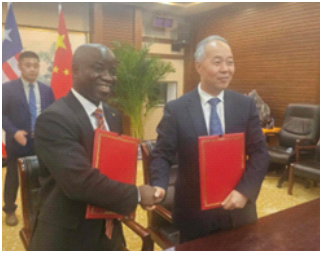By B. Linus Flomo
The Ministry of Agriculture and the Rural Affairs of the People’s Republic of China have signed a landmark Memorandum of Understanding (MoU) to strengthen bilateral cooperation in agriculture.
The MoU, crafted last week is a significant step towards enhancing technical cooperation and capacity building in the various fields of agriculture.
With its far-reaching benefits, this milestone agreement aims to drive agricultural development and ensure food security in both countries.
The MoU takes immediate effect and is valid for five years with an automatic extension for succeeding five-year periods.
Under the terms of the MoU, the ministries of both countries have committed to fostering collaboration across various aspects of agriculture and this includes sharing specific technical expertise such as advanced irrigation techniques and best practices like integrated pest management to improve agricultural productivity.
The agreement also seeks to promote bilateral trade to diversify agricultural products and increase overall output, thereby contributing to economic growth.
At the signing ceremony, Agriculture Minister Alexander Nuetah expressed optimism about the partnership’s success, highlighting its potential benefits.
“The signing of the MoU marks the beginning of the sustainable development of agriculture in Liberia,” he stated.
“Our goal as a country is to ensure that Liberia not only becomes self-sufficient in food security but also uses agriculture as a means for job and wealth creation, poverty alleviation, and rural development through mechanization, small-scale industry development, and sustainable value addition,” he further emphasized.
The Vice Minister of Agriculture and Rural Affairs, Ma Youxiang, signed on behalf of the Chinese government and said the key areas of intervention outlined in the MoU include agricultural mechanization to enhance farming practices and increase productivity, capacity building, agricultural processing and value chain enhancement to add value to agricultural products and facilitate market access.
Others are fisheries and aquaculture, which promote sustainable aquaculture practices and seafood production, animal husbandry, including livestock and poultry, and the prevention and control of animal diseases to safeguard animal health and ensure food safety.
This partnership ushers in a new chapter in their longstanding relationship. It also accentuates the shared commitment to sustainable agricultural development and fostering a thriving agricultural sector.
Both countries look forward to the fruitful outcomes of this collaboration and its positive impact on the agricultural landscape.

